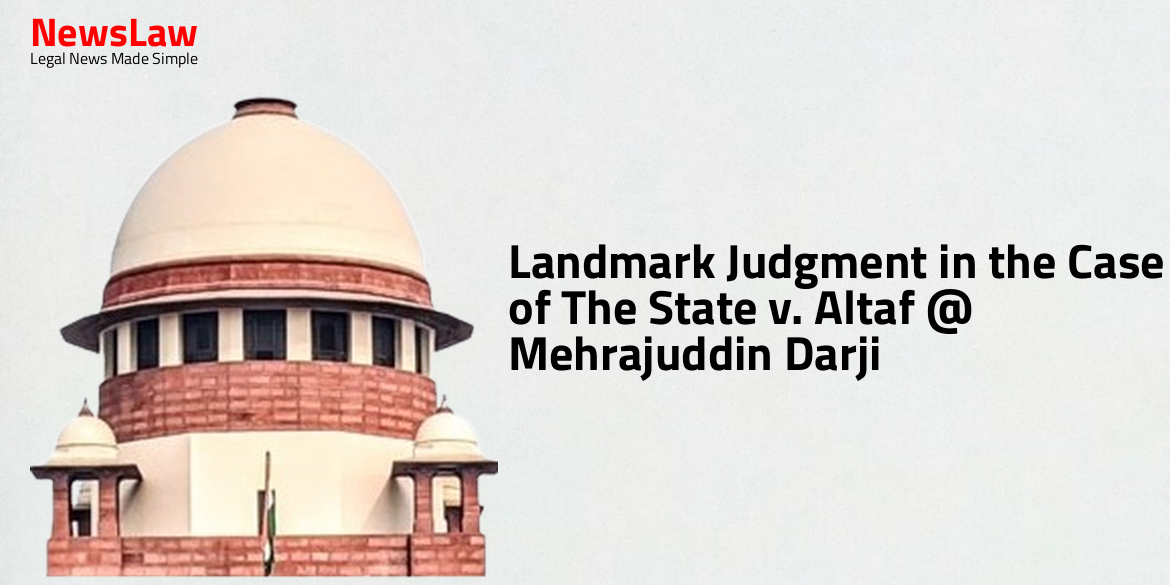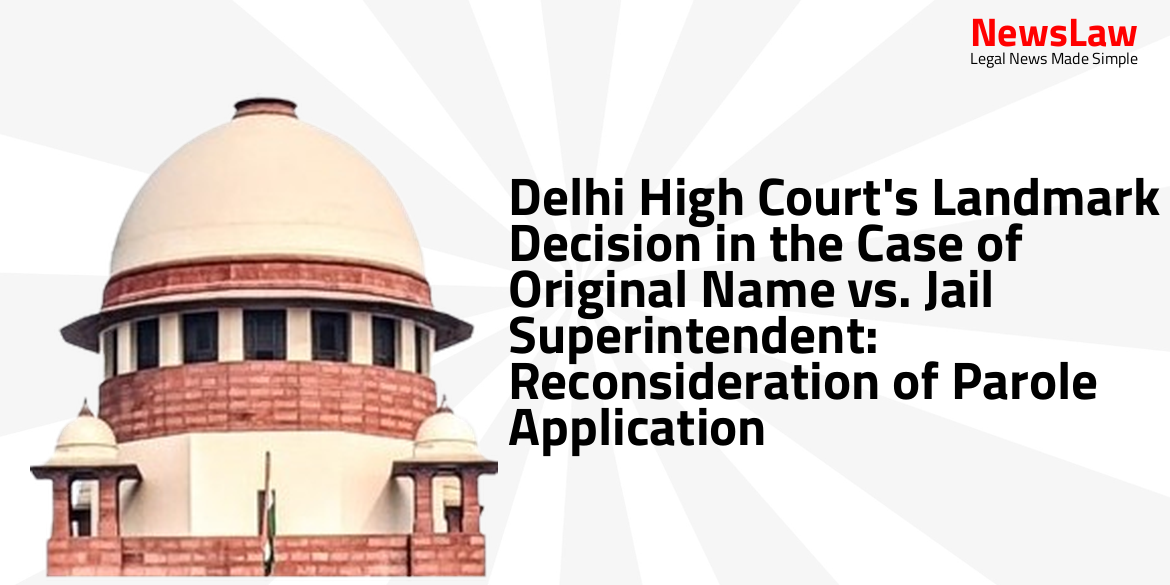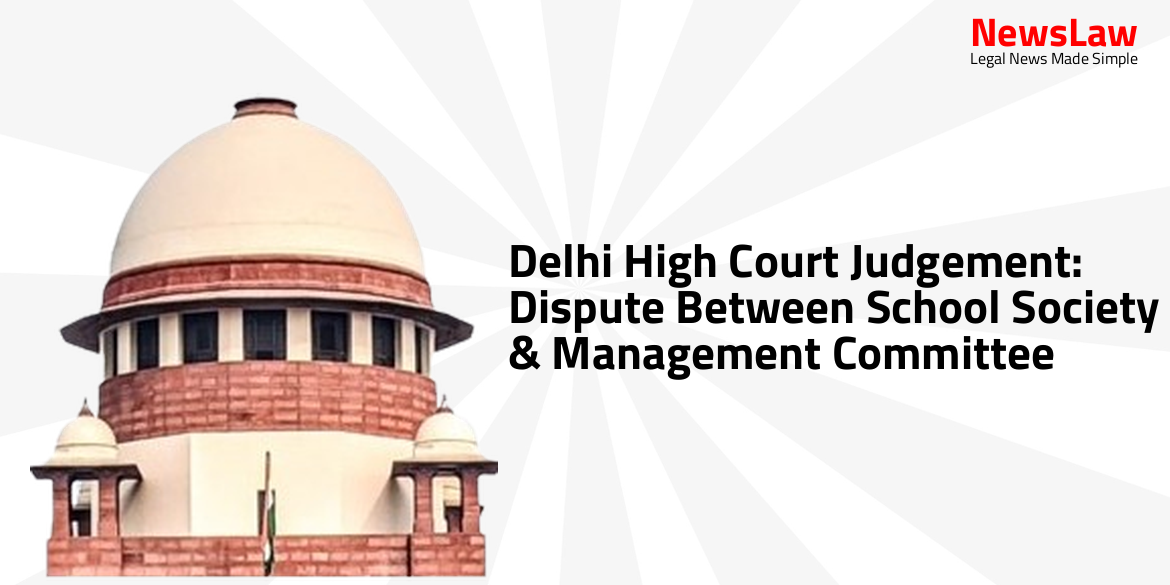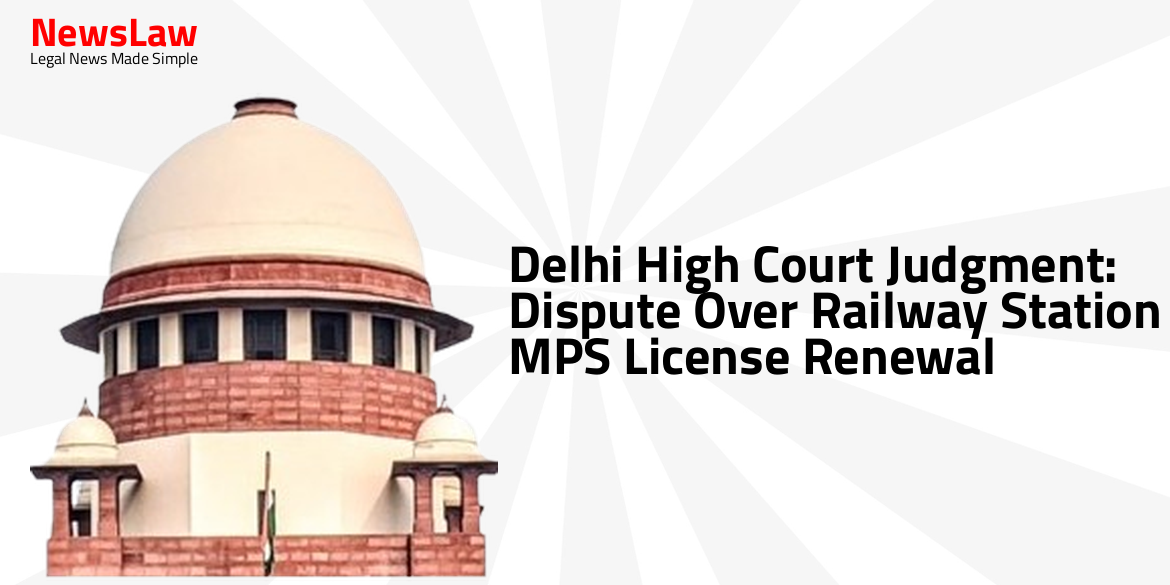In a significant legal development, the Delhi High Court has delivered a landmark judgment in the case of The State v. Altaf @ Mehrajuddin Darji. This case pertains to intricate details of a contraband consignment and clandestine facility, with serious implications for the accused. The judgment sheds light on crucial aspects of the NDPS Act and the need for fair and expedient legal processes. Stay tuned to grasp the essence of this groundbreaking verdict!
Facts
- Specific information was received regarding a consignment of contraband being delivered by Altaf @ Mehrajuddin Darji in the area of Zakir Nagar, Delhi.
- The involvement of four other persons including the petitioner was revealed based on disclosures made by a co-accused.
- Contraband was recovered from various accused persons during raids conducted based on disclosure statements.
- A clandestine contraband facility was unearthed in a house in Batla House, Okhla, Delhi, belonging to a co-accused who was already in jail for a previous NDPS Act case.
- A total of 29.50 Kilograms of contraband and reconstitution materials were recovered from the clandestine facility.
- During the investigation, multiple individuals were apprehended, including Abdullah Najibullah @ Nabi and Altaf @ Mehrajuddin Darji, with contraband being recovered from their possessions.
Arguments
- The co-accused disclosed the name of the petitioner in his statement on 14.05.2021, but no action was taken until 04.10.2021.
- Signatures on the disclosure statements are different from the petitioner’s.
- The right to claim default bail extinguishes if the accused does not apply before the charge-sheet is filed.
- The trial is expected to be lengthy with 37 witnesses, and the petitioner has been in incarceration for over two years without charges being framed.
- The disclosure statements lack credibility as per Section 25 of the Indian Evidence Act.
- The FSL report was only filed on 04.03.2022 along with the supplementary charge-sheet.
- The petitioner is alleging unlawful long-term incarceration violating fundamental rights.
- There is a lack of corroborative evidence linking the petitioner to the alleged crimes.
- The petitioner has filed for a judicial inquiry on false recovery allegations but no action has been taken.
- The petitioner is seeking statutory bail under Section 167(2) of the Cr.P.C.
- The possibility of tampering with evidence cannot be ruled out.
- The alleged seizure memo does not bear the petitioner’s signature.
- Concerns raised about the delay in filing certain documents and reports by the prosecution.
- Allegations surrounding fake documents and a plan to escape the country with alternate identities.
- The petitioner is portrayed as the main figure in a drug supply syndicate, posing a flight risk if granted bail.
- The petitioner has raised concerns regarding the chain of custody of the allegedly recovered contraband not being mentioned in the charge-sheet.
- It is argued that no infirmity can be found in the petitioner’s case due to this oversight.
- Reference is made to the case of Kapil Wadhwan to support the argument that mere delay in taking cognizance does not entitle the accused to seek default bail.
Analysis
- The seizure report from the alleged recovery premises does not bear the petitioner’s signatures, raising doubts about his involvement in the offense.
- The delay in arresting the petitioner after the knowledge of his alleged involvement further weakens the prosecution’s case.
- The charge-sheet was filed without the FSL report, but within the statutory period, which does not invalidate it.
- The court focuses on the offense committed, not just the offender.
- The delay in compliance with Section 52A of the NDPS Act and the claim to default bail were discussed during the proceedings.
- The conditions for bail under special acts like the NDPS Act require the court to assess likely guilt of the accused and their likelihood of reoffending.
- The court emphasized the need for expeditious actions in terms of making applications and certifications under the NDPS Act.
- The prosecution’s case linking the petitioner to the recovered contraband lacks evidence and raises serious doubts.
- The court should reasonably assess the accused’s guilt based on the available material.
- The petitioner’s duration of custody, delay in framing charges, and pending trial proceedings were considered in the bail application.
- The stringent conditions under Section 37 of the NDPS Act require the court to be reasonably satisfied of the accused’s innocence before granting bail.
- The prosecution’s reliance on the alleged Rent Agreement and the delay in presenting the contraband before the Magistrate were noted in the assessment.
- The court highlighted the need for establishing the chain of custody in the trial and not pre-judging it.
- The plea for default bail and the lack of links between the co-accused and the petitioner were dismissed by the court.
- In the case of Dheeraj Kumar Shukla v. State of U.P., the Supreme Court released the accused on bail, considering the commercial nature of the quantity recovered from the petitioner.
- The court referred to previous cases like Rabi Prakash and Mohd. Muslim where the prolonged incarceration of individuals was highlighted, leading to the granting of conditional liberty despite statutory restrictions in the NDPS Act.
- Gurpreet Singh v State of NCT of Delhi emphasized the impact of trial delays on bail decisions, citing the need for swift trials in cases involving NDPS Act offenses.
- The court highlighted the risks of prolonged incarceration, loss of personal identity, and hostile transformation of individuals in prison environments.
- The judgment in Kapil Wadhawan emphasized the importance of efficient investigation and setup of Designated Courts for serious crimes.
- The court referred to several cases where the absence of a completed FSL report disentitled the accused from seeking default Bail.
- Considerations of delayed trials and prolonged incarceration have influenced bail decisions, balancing the accused’s right with the necessity for fair and speedy trial processes.
- The court noted the overcrowding and poor living conditions in jails, stressing the importance of concluding trials swiftly to avoid unnecessary deprivation of personal liberty.
- Gurjeet Singh (Supra) cannot support the petitioner because the Interim Bail in the case had been in incarceration for 1 year and 2 months
- The quantity involved in the case was considered intermediate as per the NDPS Act and not based on the petitioner’s contention
- Therefore, the petitioner is not entitled to default bail
Decision
- The petitioner shall provide all/latest/fresh mobile numbers to the IO concerned and keep them in working condition.
- The petitioner shall not switch off or change mobile numbers without prior intimation to the Court and IO.
- Any change in residential address must be communicated to the Court and IO through an affidavit.
- Observations made are solely for deciding bail and not for expressing views on the case’s merits.
- The petitioner meets the criteria under Section 37(1)(b) of the NDPS Act for bail.
- Surrender of passport is required, and leaving the country needs prior permission from the Court.
- Permanent address must be provided to the Court.
- Involvement in similar cases could result in bail cancellation upon prosecution application.
- No communication or contact with prosecution witnesses and no tampering with evidence.
- No engagement in criminal activities while on bail.
Case Title: ROHIT Vs. STATE (2024:DHC:4530)
Case Number: CRL.M.C.-371/2022



